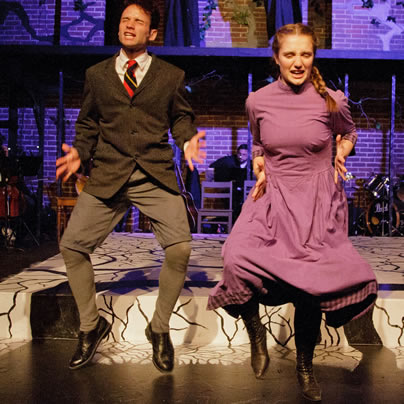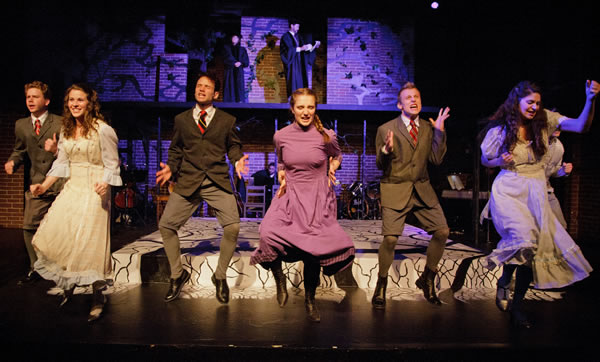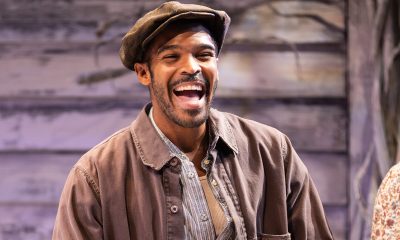Arts & Entertainment
Heat of the moment
Heady ‘Awakening’ explores teen lust in coming-of-age hit musical

‘Spring Awakening’
Keegan Theatre
Church Street Theatre
1742 Church Street, NW
Through July 8
$40, $35 students/seniors

The cast of Keegan Theatre’s production of ‘Spring Awakening.’ (Photo by C. Stanley Photography; courtesy Keegan)
Surprisingly, it’s a plaintive ballad that haunts both acts of “Spring Awakening,” the explosive trail-breaking rock musical now onstage in an excellent production by the Keegan Theatre. “The Word of Your Body” is sung by two pairs of young lovers who are about to dive into the dangerous and mysterious world of sex. With a fascinating blend of naiveté and awareness, they sing, “O, I’m gonna be wounded. O, I’m gonna be your wound.”
In Act One, it’s sung by Melchior and Wendla; in Act Two it’s sung by Hanschen and Ernst. In an unusual twist, it’s the straight couple and not the gay couple who come to a tragic end.
“Spring Awakening” is based on a controversial play by the remarkable German playwright Frank Wedekind. Although written in 1891, the play was not performed until 1906 and has since had a long history of censorship as it deals frankly with complex issues of sexual and intellectual awakening, adolescent rebellion, sadomasochism, political and intellectual repression, suicide, abortion, sexual abuse, gender and homosexuality.
The plot centers on Melchior Gabor (Vincent Kempski), a charismatic and intelligent teen rebel, his innocent but curious girlfriend Wendla (Ali Hoxie) and his tormented best friend Mortiz Steifel (Paul Scanlan). While Melchior and his classmates (including Hanschen and Ernst) deal with oppressive schoolmasters and uncontrolled sexual yearnings, Wendla and her friends deal with parental abuse and neglect.
Indie musicians Steven Sater (book and lyrics) and Duncan Sheik (music) have turned this 1891 German drama into a contemporary rock musical with exceptional ingenuity and creativity. Sheik and Sater wisely keep most of the plot intact and keep the action in its original time period. However, as the teenagers express their inner feelings, their inner rock stars erupt, electric guitars serving as a timeless expression of teen angst. The concept works really well and the show deservedly swept the 2007 Tony Awards.
Directors Mark A. Rhea and Susan Marie Rhea handle this challenging material with great finesses and sensitivity, guiding the talented cast through their scenes with an effective blend of comedy and tragedy. The musical staging is generally fluid and eye-catching as the cast moves from the relative still of the book scenes to the explosive outbursts of the songs. Musical Director Jake Null gets great instrumental performances from a superb 10-piece band and outstanding vocal performances from powerhouse singers with exceptional range and diction.
The cast is uniformly strong, with outstanding performances from Nora Palka as Ilsa and Charlotte Akin as the Adult Women. Palka’s rich voice brings great poignancy to songs where she tells about horrible sexual abuse (“The Dark I Know Well”) and where she tries to save the suicidal Moritz (“Blue Wind”), but she also shines when she leads the cast in the moving finale (“The Song of Purple Summer”). Akin is delightful in several small roles, showing great comic flair as a busty piano teacher and a mean schoolmistress, severe earnestness as Wendla’s mother and deeply moving sensitivity as Melchior’s sympathetic mother.
There are, unfortunately, a few missteps (quite literally) in this otherwise fine production. The choreography by Kurt Boehm sometimes undermines the delicate balance between the period setting and the contemporary rock score; fluttery hand gestures, cartwheels and moves from Michael Jackson videos feel out of place. The direction of the three-member ensemble is also rather awkward. The switch from teenagers to angels of death clutters the final scene and their costuming and blocking is frequently distracting.
While most cultural venues have already slipped into more escapist summer fare, Keegan Theatre deserves a round of applause for ending their season with more challenging material. LGBT audiences will find “Spring Awakening,” with its positive portrayal of homosexuality and complex depictions of sexual politics, especially rewarding.
Sports
Bisexual former umpire sues Major League Baseball for sexual harassment
Brandon Cooper claims female colleague sexually harassed him

A fired former umpire is suing Major League Baseball, claiming he was sexually harassed by a female umpire and discriminated against because of his gender and his sexual orientation.
Brandon Cooper worked in the minor league Arizona Complex League last year, and according to the lawsuit he filed Wednesday in federal court in Manhattan, he identifies as bisexual.
“I wanted my umpiring and ability to speak for itself and not to be labeled as ‘Brandon Cooper the bisexual umpire,’” he told Outsports. “I didn’t want to be labeled as something. It has been a passion of mine to simply make it to the Major Leagues.”
But that didn’t happen. Instead of being promoted, he was fired. His suit names MLB and an affiliated entity, PDL Blue, Inc., and alleges he had endured a hostile work environment and wrongful termination and/or retaliation because of gender and sexual orientation under New York State and New York City law.
“Historically the MLB has had a homogenous roster of umpires working in both the minor and major leagues,” Cooper claims in his suit. “Specifically, to date there has never been a woman who has worked in a (regular) season game played in the majors, and most umpires are still Caucasian men. To try to fix its gender and racial diversity issue, defendants have implemented an illegal diversity quota requiring that women be promoted regardless of merit.”
Cooper claims former umpire Ed Rapuano, now an umpire evaluator, and Darren Spagnardi, an umpire development supervisor, told him in January 2023 that MLB had a hiring quota, requiring that at least two women be among 10 new hires.
According to the suit, Cooper was assigned to spring training last year and was notified by the senior manager of umpire administration, Dusty Dellinger, that even though he received a high rating in June from former big league umpire Jim Reynolds, now an umpire supervisor, that women and minority candidates had to be hired first.
Cooper claims that upon learning Cooper was bisexual, fellow umpire Gina Quartararo insulted him and fellow umpire Kevin Bruno by using homophobic slurs and crude remarks. At that time, Quartararo and Cooper worked on the same umpiring crew and being evaluated for possible promotion to the big leagues.
This season, Quartararo is working as an umpire in the Florida State League, one of nine women who are working as minor league umpires.
Cooper said he notified Dellinger, but instead of taking action against Quartararo, he said MLB ordered Cooper to undergo sensitivity training. According to his lawsuit, he was also accused of violating the minor league anti-discrimination and harassment policy.
Cooper’s suit says he met with MLB Senior Vice President of Diversity, Equity and Inclusion Billy Bean — who the Los Angeles Blade reported in December is battling cancer.
The lawsuit says at that meeting, Bean told the umpire that Quartararo claimed she was the victim, as the only female umpire in the ACL. Cooper said he told Bean Quartararo regularly used homophobic slurs and at one point physically shoved him. He also claims that he has video evidence, texts and emails to prove his claim.
But he said his complaints to Major League Baseball officials were ignored. His lawsuit said MLB passed him over for the playoffs and fired him in October. He said of the 26 umpires hired with Cooper, he was the only one let go.
Through a spokesperson, MLB declined to comment on pending litigation. Quartararo has also not publicly commented on the lawsuit.
a&e features
Eastern Shore chef named James Beard Finalist
Harley Peet creates inventive food in an inclusive space

In a small Eastern Shore town filled with boutiques, galleries, and the occasional cry of waterfowl from the Chesapeake, Chef Harley Peet is most at home. In his Viennese-inflected, Maryland-sourced fine-dining destination Bas Rouge, Peet draws from his Northern Michigan upbringing, Culinary Institute of America education, and identity as a gay man, for inspiration.
And recently, Peet was named a James Beard Finalist for Best Chef: Mid-Atlantic – the first “Best Chef: Mid-Atlantic” finalist representing the Eastern Shore.
Peet, after graduation from the Culinary Institute of America, took a position as sous chef at Tilghman Island Inn, not far from Bas Rouge. Falling in love with the Eastern Shore, he continued his passion for racing sailboats, boating, gardening, and fishing, and living his somewhat pastoral life as he opened Bas Rouge in 2016 as head chef, a restaurant part of the Bluepoint Hospitality group, which runs more than a dozen concepts in and around Easton, Md.
Coming from a rural area and being gay, Peet knew he had his work cut out for him. He was always aware that the service and hospitality industry “can be down and dirty and rough.”
Now as a leader in the kitchen, he aims to “set a good example, and treat people how I want to be treated. I also want to make sure if you’re at our establishment, I’m the first to stand up and say something.”
The Bas Rouge cuisine, he says, is Contemporary European. “I’m inspired by old-world techniques of countries like Austria, Germany, and France, but I love putting a new spin on classic dishes and finding innovative ways to incorporate the bounty of local Chesapeake ingredients.”
His proudest dish: the humble-yet-elevated Wiener Schnitzel. “It is authentic to what one would expect to find in Vienna, down to the Lingonberries.” From his in-house bakery, Peet dries and grinds the housemade Kaiser-Semmel bread to use as the breadcrumbs.
Peet works to support the LGBTQ community inside and outside of the kitchen. “I love that our Bluepoint Hospitality team has created welcoming spaces where our patrons feel comfortable dining at each of our establishments. Our staff have a genuine respect for one another and work together free of judgment.”
Representing Bluepoint, Peet has participated in events like Chefs for Equality with the Human Rights Campaign, advocating for LGBTQ rights.
At Bas Rouge, Peet brings together his passion for inclusion steeped in a sustainability ethic. He sees environmental stewardship as a way of life. Peet and his husband have lived and worked on their own organic farm for several years. Through research in Europe, he learned about international marine sourcing. Witnessing the impacts of overfishing, Peet considers his own role in promoting eco-friendly practices at Bas Rouge. To that end, he ensures responsible sourcing commitments through his purveyors, relationships that have helped create significant change in how people dine in Easton.
“I have built great relationships in the community and there’s nothing better than one of our long-standing purveyors stopping in with a cooler of fresh fish from the Chesapeake Bay. This goes especially for catching and plating the invasive blue catfish species, which helps control the species’ threat to the local ecosystem.
Through his kitchen exploits, Peet expressed a unique connection to another gay icon in a rural fine-dining restaurant: Patrick O’Connell, of three Michelin starred Inn at Little Washington. In fact, Peet’s husband helped design some of O’Connell’s kitchen spaces. They’ve both been able to navigate treacherous restaurant-industry waters, and have come out triumphant and celebrated. Of O’Connell, Peet says that he “sees [his restaurants] as canvas, all artistry, he sees this as every night is a show.” But at the same time, his “judgment-free space makes him a role model.”
Being in Easton itself is not without challenges. Sourcing is a challenge, having to either fly or ship in ingredients, whereas urban restaurants have the benefit of trucking, he says. The small town “is romantic and charming,” but logistics are difficult – one of the reasons that Peet ensures his team is diverse, building in different viewpoints, and also “making things a hell of a lot more fun.”
Reflecting on challenges and finding (and creating) space on the Eastern Shore, Peet confirmed how important it was to surround himself with people who set a good example, and “if you don’t like the way something is going … move on.”

Team DC, the umbrella organization for LGBTQ-friendly sports teams and leagues in the D.C. area, held its annual Night of Champions Awards Gala on Saturday, April 20 at the Hilton National Mall. The organization gave out scholarships to area LGBTQ student athletes as well as awards to the Different Drummers, Kelly Laczko of Duplex Diner, Stacy Smith of the Edmund Burke School, Bryan Frank of Triout, JC Adams of DCG Basketball and the DC Gay Flag Football League.
(Washington Blade photos by Michael Key)



















-

 State Department3 days ago
State Department3 days agoState Department releases annual human rights report
-

 Maryland4 days ago
Maryland4 days agoJoe Vogel campaign holds ‘Big Gay Canvass Kickoff’
-

 Politics4 days ago
Politics4 days agoSmithsonian staff concerned about future of LGBTQ programming amid GOP scrutiny
-

 District of Columbia22 hours ago
District of Columbia22 hours agoCatching up with the asexuals and aromantics of D.C.











